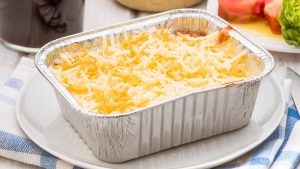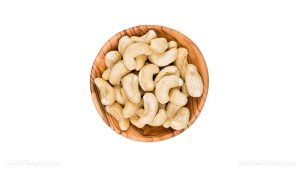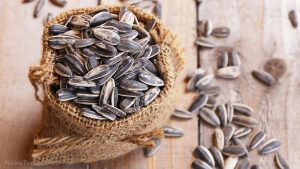
Advertisement
Cheese is a favorite among foodies, but this tasty ingredient is also full of saturated fat and sodium that can cause weight gain and other health problems. If you’re torn about giving up cheese and improving your eating habits, consider switching to a healthier alternative: Nut cheeses.
Too much cheese can be bad for you (and the environment)
Cheese is considered a tasty superfood because it contains calcium, protein and vitamin A. That said, cheese is also one of the main sources of saturated fat and sodium in the standard Western diet.
Both saturated fat and sodium are bad for you, especially when consumed in excess. The National Cancer Institute reports that regular cheese and pizza are the top two contributors of saturated fat, making up at least 15 percent of the total saturated fat intake in the American diet.
Cheese also makes up about one-tenth of the sodium consumed by Americans annually.
Too much cheese isn’t just bad for your health, it also has adverse effects on the environment. Cheese production is linked to severe air pollution and experts report that it produces both particulate matter in the form of dust, as well as manure along with high concentrations of methane.
Runoff from dairy farms also pollutes the water supply. Wisconsin, the “cheese capital” of the country, is a known pollutant of groundwater aquifers via high concentrations of nitrogen from dairy operations in the state.

Nut cheese is better for you
Nut cheese is made out of nuts, along with some seeds such as pumpkin and sunflower.
As a bonus, nuts and seeds also offer health benefits. Some epidemiologic studies suggest that nut consumption can help reduce your risk of heart disease and gallstones. Eating nuts regularly can also help prevent diabetes, hypertension, inflammation and certain types of cancer.
Vegan and vegetarian cookbooks often included recipes for nut cheese spreads made by soaking cashews or almonds and blending them in water with herbs and spices. These nut cheeses would have to be set aside to ferment.
These days, nut cheeses have become more accessible. You can even make nut cheese at home using probiotics or fermented grain water called rejuvelac. These ingredients can be found at the nearest health food store and you can choose recipes that suit your cheesy needs.
Types of nut cheese
Nut cheese is usually made from cashews, which produce a creamy cheese. They also be made from other nuts and seeds such as:
- Almonds
- Hemp seeds
- Macadamia nuts
- Pistachios
- Pumpkin seeds
- Sunflower seeds
Coconut oil is sometimes added to make firmer nut cheeses at refrigerated temperatures. Like regular cheese, using different ingredients will produce hard cheese, meltable cheese, sliceable cheese, smoked cheese, or stinky cheese (complete with a moldy crust).
Like dairy cheese, nut cheese has many culinary uses:
- Used to make a sandwich.
- Paired with crackers or veggie slices.
- Added as an ingredient in a velvety sauce.
- Used as a dip for veggies or chips.
- Added to baked dishes like casseroles, enchiladas, or lasagna.
You can buy nut cheese at the “alternative dairy” refrigerated section of the nearest local grocery or health food store. Just make sure you check every product’s ingredients list since some nut cheeses may contain unspecified natural flavorings, additives and oils.
You can also find nut cheese at an artisan nut cheese shop or at a neighborhood farmers’ market.
Nut cheese recipes to try at home
Nut cheese can also be made at home using only a handful of easy-to-find ingredients and some pieces of equipment. With some trial and error, you can start making nut cheese that’s perfect for snacking or cooking.
Below are some incredible nut cheese recipes that you can try making at home.

Vegan cashew nut cheese
This recipe makes a tasty garlic and herbs cheese made from cashew, agar powder, nutritional yeast and spices. Vegan cashew nut can be served on bagels, celery, or crackers.
Ingredients:
- 1 cup of water, divided
- 1/2 cup of cashews (60 g)
- 3 tablespoons of nutritional yeast
- 1 tablespoon of lemon juice or apple cider vinegar
- 1 1/2 teaspoon of agar powder
- 1 1/2 teaspoon of cornstarch
- 1 teaspoon of basil
- 1 teaspoon of maple syrup
- 1 teaspoon of oregano
- 1/2 Teaspoon of salt
- Half of a garlic clove
- Oil (To brush the ramekin.)
Preparation:
- Soak the cashews in hot water for one hour.
- Drain the cashews and place them in a blender with the basil, oregano, garlic, salt, cornstarch, nutritional yeast, lemon juice, maple syrup and half a cup of water. Blend the mixture for one minute, then set aside.
- In a saucepan, pour the rest of the water and the agar powder. Add the cashew cream, then bring to a boil. Stir constantly.
- Pour the mixture into lightly oiled ramekins and refrigerate for at least two hours.
- When you’re ready to serve, remove the nut cheese by turning the ramekin upside down onto a board or plate.
Vegan pistachio nut cheese
This simple vegan nut cheese recipe contains pistachio nuts. The final product even slices and grates like dairy cheese.
Ingredients for 10 servings:
- 1 1/2 cups of water
- 1 cup (150 g) of pistachio nuts, shelled
- 1/2 cup (40 g) of nutritional yeast
- 1 tablespoon of maple syrup (Or any natural sweetener of choice.)
- 1 tablespoon of agar powder
- 1 tablespoon of apple cider vinegar
- 2 cloves of garlic
- 1/2 lemon, juiced
- 2 pinches of salt
Preparation:
- Soak the pistachio nuts in water with a pinch of salt for one hour or overnight. The next day, discard the soaking water.
- Place half of the water and the rest of the ingredients, except the agar, into the blender.
Blend the nut mixture until smooth. - Pour the remaining water into a pan and add the agar powder. Simmer for five minutes and stir constantly. Get rid of any agar lumps at the bottom of the pan.
- Remove the agar mixture from the heat then stir in the pistachio mixture until well combined.
- Pour the nut cheese mixture into a mold and let it chill for two hours.
- Serve the pistachio cheese within three days and keep chilled.

Vegan sunflower seed cheese
This nut-free vegan cheese can be used to make sandwiches, added to a salad, or spread on crackers.
Ingredients for 2 servings:
- 2 cups of raw sunflower seeds, softened
- 1/4 cup of lemon juice
- 1/4 cup of nutritional yeast
- 1/4 cup of refined coconut oil
- 4 teaspoons of white miso paste
- 1 teaspoon of garlic powder
- 1 teaspoon of smoked paprika
- 1/2 teaspoon of salt (or to taste)
- 1/2 teaspoon of turmeric
To soften the sunflower seeds:
First, soften the sunflower seeds to make them easier to blend. This will also make the cheese smoother. You can do this by boiling or soaking the seeds.
Boiling the seeds:
- Put the sunflower seeds in a medium-sized pot and cover them with enough water. Bring to a boil for 10 to 15 minutes or until the sunflower seeds have softened.
- Drain and rinse before preparing the cheese.
Soaking the seeds:
- Place the sunflower seeds in a bowl then cover the seeds with water. Soak overnight until tender.
- Drain the seeds and rinse before preparing the cheese.
Preparation:
- Add all of the ingredients to a food processor. Blend until the mixture is as smooth as possible. Stop to scrape the sides as needed.
- Prepare the molds and line them with plastic wrap or parchment paper.
- Once the cheese is blended, scoop the mixture into the molds and smoothen the top. Cover and chill in the fridge for four hours or overnight to let the cheese firm up. The cheese will be firm when it’s fresh out of the fridge, but it will soften the longer it sits out.
- The pistachio nut cheese will keep well in an air-tight container in the fridge for around one week.
Giving up dairy cheese doesn’t mean you can’t have cheese anymore. Just switch to healthier alternatives like nut cheese that you can make at home using your preferred nuts or seeds.
Sources:
Advertisements







